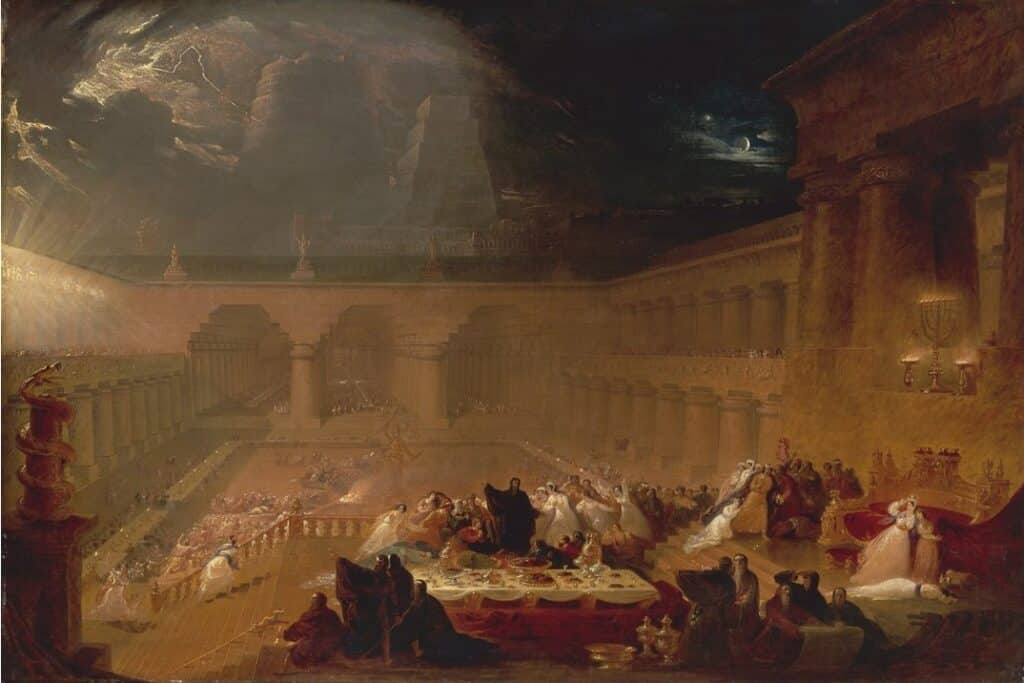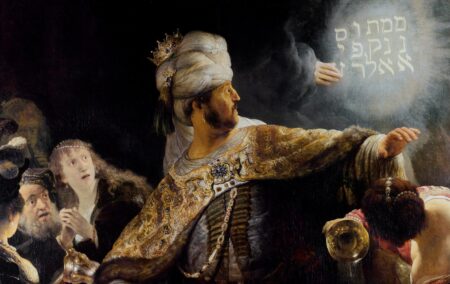‘Suddenly the fingers of a human hand appeared and wrote on the plaster of the wall, near the lampstand in the royal palace. The king watched the hand as it wrote. His face turned pale and he was so frightened that his legs became weak and his knees were knocking.’
The account of Belshazzar’s Feast in the Book of Daniel has burned itself into the world’s cultural consciousness. It is the stuff of high drama, the intrusion of the supernatural into the temporal, the humbling of the mighty by the Almighty, the rebuking of pride and a warning that once sin is marked for judgement, that judgement will be swift and final.
After Belshazzar affronted God by drinking from the vessels plundered from the temple in Jerusalem to drink to the Babylonian idols, God placed His seal upon Belshazzar and his court: MENE, MENE, TEKEL, PARSIN.
‘God has numbered the days of your reign and brought it to an end.
You have been weighed on the scales and found wanting.
Your kingdom is divided and given to the Medes and Persians.’
That night, Belshazzar was killed, and his kingdom passed to new overlords.
More than a story of religion and morality, it has passed into the idiomatic canon of the English language: ‘the writing is on the wall’. Circumstances are portrayed in a dark and foreboding manner such that those who trouble to understand them can predict their outcomes. A 19th Century painting of the scene by the English painter John Martin linked the sense of terror at the radiating script on the wall with a storm brewing in the sky above. It is a powerful metaphor.

Martin’s depiction is one that a growing number of South Africans could no doubt identify with, for an atmosphere of trepidation hangs above South Africa.
Mendicants at the gates
It’s evident across the face of the country. In the panhandlers at street corners and medicants at the gates of the more affluent. Those who rummage through rubbish bins looking for throwaways of meagre value. The knots of young people holding up signs advertising building and renovating skills outside hardware stores. And the millions of others enduring frustrated and sometimes desperate lives with little opportunity, within shacklands and in corners of the country of which the more fortunate may be unaware.
Understand the numbers. The World Bank puts some 30.3 million South Africans, more than half the population, as living in poverty – with close to 14 million experiencing difficulty in buying enough food. The unemployed, enumerated by Stats SA, number some 7.2 million – or 11.4 million, if those who have given up looking for work are included. Against a labour force of 26.4 million, and an employed pool of just under 15 million, the scale of the unemployment crisis is apparent.
Behind this has been the anaemic economic growth that has characterised the past decade. The National Development Plan called for growth at 5.4% a year – yet the best managed in this period was 3.3% in 2011. Since President Ramaphosa’s ascent to office, the best South Africa managed was 0.8%. Behind this has been an overall fall in investment, local and foreign, in recent years.
All of these – combined with pervasive crime and insecurity, with ill-maintained infrastructure, with an education system that fails its charges – are a grim portent of the future.
Yet, like Belshazzar and his courtiers, those who should have known better and those who might have resisted contented themselves with the arrogance of their incumbency and empty assurances of better things to come. Rather than idols of gold, silver, bronze, iron, wood and stone, there were the false gods of ideology and the endless policy documents and seductive half-promises from those in power.
Indeed, South Africa’s descent had much to do with the choices that were made, and they were legion. These include the steady creep of state responsibilities and discretion, even as the deliberate politicisation of the state rendered its ability to fulfil these mandates increasingly implausible. Corruption and malfeasance that not only plundered the state’s coffers but the sanctums of its institutions. Policies that imposed costs on investments and disincentivised employment. And the spectre of more to come.
Scant criticism, endless engagement
Cue business. Concerned about the state of the country to be sure, it seemed unable to put its finger on the problem. Well-meaning policies, bad implementation? Surely – surely! – not the intent? Scant criticism, endless engagement. Partnership. And the search for the Messiah that will deliver.
Cue also the media, much of it anyway. ‘Understand the challenges and the limitations. Understand the complex game of fox-and-hounds that makes victories of what, to outward appearances, might seem like failures. Indeed, rejoice, for in President Ramaphosa, the Messiah has in fact come.’
The writing may be ignored. The feast might continue, the torpor of the wine-deadening awareness. Perhaps that describes so much of South Africa’s experience. The Institute of Race Relations has been warning of the consequences of the hazardous road South Africa has been travelling on. And while many have heard us, relatively few have been willing truly to listen.
‘The writing is on the wall’ is a moment of revelation. The words that are inscribed into the plaster are also imprinted onto reality. Theirs is a dread truth, and an unavoidable fate. All the wilful blindness, the mockery and contortions of logic, of the wise and powerful will not wish them away.
Fearful, Belshazzar summoned Daniel, who read the message and revealed the fate of Babylon.
Perhaps that moment has now arrived.
On Monday, the ANC put forward its proposed changes to the pending amendment to Section 25 of the Constitution. This would significantly sideline the courts from the process, and more profoundly, would direct the custodial taking of land in South Africa. Its formula reads: ‘The state must take reasonable legislative and other measures, within its available resources, to foster conditions which enable state custodianship of land and for citizens to gain access to land on an equitable basis.’
A likely end point
For years, the IRR has sounded a warning that this is a likely end point in the drive for property rights. The signs were clearly evident from their origins, in the ambivalence on the part of many in the ANC to the idea of constitutional protection of property rights – the relevant clause was once described as a ‘sunset clause’ – and legislation that vested water and mineral rights in the state.
More precisely, the introduction in 2008 of new draft expropriation legislation signalled that the state was intent on expanding its power over private assets. While the pushback on this led to its withdrawal, the state continued to probe opportunities to introduce this legislation.
Fortune was with it when the Constitutional Court ruled in 2013 that ‘custodianship’ was distinct from expropriation. Failing to define precisely what custodianship meant, the judgment held that while it deprived a property holder of his or her rights, it was not an act of expropriation (since, contentiously, the property would not have been transferred to a new owner), and therefore, no compensation was required.
This is a principle that the government has long sought to turn into a general principle. In 2014, only a year later, an early version of the Preservation and Development of Agricultural Land Framework Bill sought to vest custodianship of all agricultural land in the state. Although this piece of legislation was withdrawn – in the face of opposition in which the Institute played a key role – the sentiments underneath it have been reaffirmed regularly by government officials and leading members of the ruling party.
The Institute’s warnings went largely unheeded. Indeed, they were often directly rejected, even after the ANC had committed itself to Expropriation without Compensation, and even as the Constitution came under the knife. To suggest that this was a hazardous and reckless course was a species of heresy – the ‘reformist’ inclinations of President Ramaphosa notwithstanding (though what these were was never specified).
Simply not possible
This was simply not possible, came the response. The damage it would do would unmake whatever ambitious goals the newly minted president had. Besides, ‘South Africa has a fine Constitution and a strong legal framework.’ Yet this view rests on faith, not reason. And as is the nature of faith, it reconciles logical inconsistencies: a dependence on the constitutional protection of property, even as the clear purpose of the process in motion was to remove it…
Thus, we stand now with warnings writ large.
Perhaps there is something almost biblically symbolic in that this is happening against the background of what scripture would describe as a plague. The juncture at which the country stands ranks with some of the most dangerous in its history. The consequences of making the wrong choices will echo for decades, and the costs may be borne by generations as yet unborn.
Yet the course that the ruling party and the government have chosen promises such a dismal future. Indeed, it has sought not to mitigate the dislocation caused by the pandemic, but to leverage it. And in so doing, it threatens to visit the tribulations on South Africa that so many of the wise and powerful confidently predicted would never happen. Indeed, mere hours before the ANC announced its position on custodianship, the Daily Maverick ran an article predicting that the moment for the president’s (undefined) reform agenda was now at hand. ‘Lights… Camera… Reform!’ blared the title. The irony is profound.
The writing, now, is on the wall.
But at least we may take solace in the knowledge that this has not been written by the finger of God, for the interpretation of His ordained sage. These things have been ordered by the actions and intentions of leaders, and acquiesced in by those around them. If the warnings are heeded – if there exists the will to heed them – a sad fate may yet be avoided.
[Image: Rembrandt, Belshazzar’s Feast, 1635, (National Gallery, London)
If you like what you have just read, support the Daily Friend


